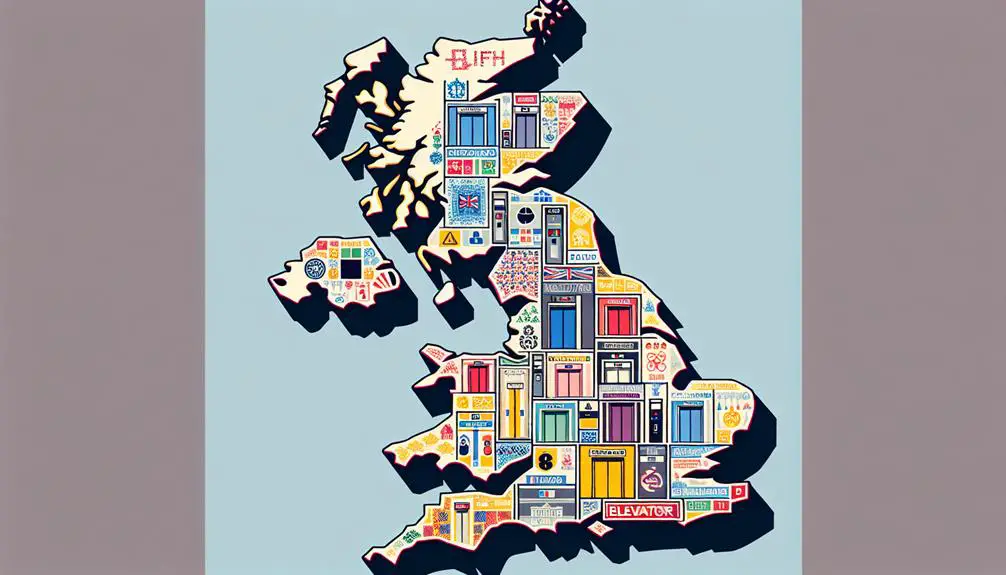Imagine stepping into an elevator, but instead of pushing a button, you say, 'I'm taking the lift.' You've just crossed an invisible cultural line, using a term that's as British as afternoon tea.
The word 'lift' might seem straightforward, but it's packed with history, cultural nuances, and variations that stretch across the UK. It's more than just a way to describe an elevator; it's a linguistic journey that offers a glimpse into British life and language.
To fully appreciate its significance and how it's woven into the fabric of everyday conversation, you'll want to explore its origins and evolution. It's a ride worth taking, and you're just at the beginning.
Origins of 'Lift

Interestingly, the term 'lift,' denoting an elevator in British English, originates from the early mechanical devices that were 'lifted' by ropes or chains, a development that fundamentally transformed vertical transportation. This evolution traces back to the industrial advancements of the 19th century when the need for efficient movement of goods and people in factories and mines necessitated the invention of mechanical lifting devices. As you delve deeper into this history, you'll find that the term 'lift' not only encapsulates the physical action of raising or being raised but also signifies a pivotal shift in architectural design and urban planning.
The integration of lifts into building designs enabled constructions to reach unprecedented heights, fundamentally altering city skylines around the world. This was particularly evident in the late 19th and early 20th centuries, a period marked by the rise of skyscrapers. Prior to the advent of lifts, buildings were seldom constructed beyond a few stories high, as the practicality of ascending numerous flights of stairs was a significant constraint.
Moreover, the etymology of 'lift' in this context is deeply intertwined with the technological innovations of the era. The invention of the safety elevator by Elisha Otis in 1852, for instance, played a crucial role in mitigating the risks associated with these early lifting devices. His design prevented the lift from falling if the lifting rope broke, a safety feature that catalyzed the widespread adoption of elevators.
Thus, the term 'lift' embodies a rich tapestry of technological progress and societal transformation, underpinning the evolution of modern urban landscapes.
Literal Meanings Explored
Delving into the literal meanings of 'lift,' we find that its application extends beyond the mechanical act of raising or being raised, encapsulating a broader spectrum of physical and metaphorical elevations within the English language. The term 'lift' is multifaceted, embodying various nuances that enrich its utilization in both colloquial and formal contexts. This exploration aims to dissect these layers, offering you a comprehensive understanding of its literal implications.
| Application | Description | Example |
|---|---|---|
| Mechanical | Relating to devices designed to elevate objects or people. | Elevators in buildings 'lift' people to different floors. |
| Physical | The act of manually raising or elevating something. | Lifting a box from the ground requires strength. |
| Emotional | Elevating someone's spirits or mood. | A kind word can 'lift' someone's spirits. |
| Economic | An increase or boost in economic terms. | A 'lift' in the stock market signals economic growth. |
| Aerodynamic | Referring to the force that holds aircraft in the air. | The wing's design enables 'lift' during flight. |
This table illustrates the diversity in the application of 'lift,' highlighting its relevance across various domains. Each instance reflects a different dimension of lifting, from the tangible act of elevating objects to the intangible effect of uplifting emotions or economic conditions. Such versatility underscores the term's significance within the English lexicon, showcasing its capacity to convey a wide array of concepts through a single word. This analytical journey through 'lift's' literal meanings reveals the term's depth and breadth, enhancing our appreciation for its role in communicating complex ideas succinctly and effectively.
Lift' in Everyday Language

Having explored the multifaceted literal meanings of 'lift,' let's now examine how this term operates within the realm of everyday language, revealing its colloquial nuances and prevalence in common discourse. The term 'lift' transcends its primary denotation to embody a spectrum of colloquial expressions, each adding a layer of richness to English vernacular, particularly within British contexts.
- Transportation Context: In Britain, 'lift' colloquially refers to what Americans call an 'elevator.' This usage is deeply ingrained in everyday British English, signifying not just the device itself but also encapsulating a broader cultural preference for certain terminologies. Beyond this, to 'give someone a lift' transcends the physical act of operating an elevator, morphing into a phrase denoting the act of providing someone a ride in a vehicle. This dual application illustrates the term's versatility in conveying distinct yet related concepts.
- Emotional Connotation: 'Lift' frequently migrates into the emotional and psychological domain, where to 'lift someone's spirits' means to elevate their mood or morale. This metaphorical usage underscores the term's capacity to articulate nuances of human emotional states, demonstrating its adaptability across contexts.
- Support and Assistance: The term also embodies the notion of aid or assistance, as in lifting a burden from someone. This conveys the act of alleviating someone's troubles or challenges, further showcasing the term's role in articulating acts of empathy and support within interpersonal relationships.
In dissecting 'lift' across these dimensions, it's evident that the term serves as a linguistic vessel, capable of conveying a broad spectrum of meanings that resonate deeply in everyday conversations. Its versatility not only enriches English language discourse but also reflects the dynamic nature of language evolution and cultural expression.
Cultural Significance
The cultural significance of the term 'lift' in British English extends beyond its colloquial use, embodying a rich tapestry of social interactions and linguistic traditions that resonate with everyday life in the UK. It's not merely a word; it's a reflection of the British penchant for understatement and practicality. When you say you need a 'lift', you're tapping into a long-standing tradition of communal assistance, a nod to a culture that values subtlety and support among its members.
| Aspect | Detail |
|---|---|
| Historical Use | Originally denoting manual assistance |
| Social Context | Signifies camaraderie and community support |
| Linguistic Role | Embodies British understatement and practicality |
Analyzing its roots, 'lift' illustrates the evolution of language in response to societal needs. Historically, its use was more physical, associated with the act of lifting. Over time, as social structures evolved, so did the term's application, transitioning into a metaphor for offering assistance in transportation. This shift highlights the adaptability of language to mirror changing social landscapes.
Furthermore, 'lift' exemplifies the British tendency towards euphemism and understatement. Instead of directly asking for help, saying you could use a 'lift' softens the request, making it more palatable. This linguistic nuance underscores a broader cultural inclination towards modesty and indirectness in communication.
Thus, 'lift' is more than slang. It's a linguistic marker of cultural identity, encapsulating British social norms, attitudes, and values. It's a testament to the dynamic nature of language, continually evolving to reflect the ethos of its people.
Variations Across the UK

Interestingly, 'lift' exhibits notable variations in its usage and connotations across different regions of the UK, reflecting the diverse linguistic landscapes within the country. While in its broadest sense, 'lift' universally means an elevator or a ride in someone's vehicle, the depth of its application and cultural nuances vary considerably, offering a fascinating glimpse into regional identities.
- In Scotland, the term 'lift' often retains its primary meaning related to vertical transportation. However, it's not uncommon to hear it used metaphorically in expressions that emphasize emotional uplift or support, illustrating the Scottish penchant for blending practicality with emotional expression. This dual use underlines a community-oriented mindset, where practical help and emotional support are intertwined.
- In Northern England, 'lift' frequently takes on a broader scope, especially in casual conversation. Besides referring to an elevator, it's widely used to mean getting a ride in someone's car. This usage highlights the Northern communities' value on practical help and solidarity, where offering a 'lift' is a common gesture of goodwill.
- In London and the Southeast, while 'lift' is understood in both the contexts of elevators and car rides, there's a noticeable preference for the term to describe technological or physical elevation. The focus tends to be more on the functional aspect, possibly reflecting the fast-paced, efficiency-driven lifestyle of the region's inhabitants.
These variations in the term 'lift' across the UK not only shed light on the linguistic diversity within the country but also mirror the distinct cultural and social priorities of its various regions.
Lift' in Popular Media
Exploring how 'lift' permeates popular media reveals its significant role in reflecting and shaping cultural narratives within the UK. You'll find that 'lift' isn't just a term used for an elevator but carries nuanced meanings across various forms of media, from music and television to literature and film. It's a linguistic marker that offers insight into societal attitudes, regional identities, and the ever-evolving nature of language.
In music, 'lift' often symbolizes elevation or escape, reflecting the artists' desires to rise above their circumstances or transport their audience to a different emotional state. British musicians frequently incorporate 'lift' into their lyrics, subtly nodding to the shared experiences of movement and change. This usage reinforces the idea of upliftment and progression, resonating deeply within the cultural psyche.
Television and film, on the other hand, utilize 'lift' both literally and metaphorically. You'll notice characters in British sitcoms or dramas using or mentioning a 'lift' in scenes that are pivotal to the plot's development, symbolizing transitions or shifts in relationships and circumstances. The metaphorical use of 'lift' in dialogue often hints at personal growth or a change in perspective, enriching the narrative and adding layers of meaning.
In literature, 'lift' frequently appears as a motif to explore themes of ascension, freedom, and transformation. Authors craft their narratives to reflect the socioeconomic and emotional landscapes of their characters, with 'lift' serving as a powerful symbol of aspiration and potential.
Through its varied use in popular media, 'lift' acts as a mirror to the complexities of British society, encapsulating the collective hopes, dreams, and challenges of its people.
Frequently Asked Questions
How Does the Use of 'Lift' in British Slang Compare to Its Usage in American English or Other Dialects?
You're exploring how 'lift' is utilized differently across dialects. In British English, it's commonly used to mean 'elevator' or a ride in a vehicle, contrasting with American English, where 'elevator' is the preferred term.
Are There Any Notable Controversies or Public Debates That Have Arisen Due to the Misunderstanding of the Term 'Lift' in a Cross-Cultural Context?
No significant controversies or public debates have emerged from misunderstandings of the term in a cross-cultural context, indicating a universal comprehension or minor impact on communication despite differences in American English or other dialects.
How Has the Slang Meaning of 'Lift' Influenced or Been Incorporated Into Branding, Marketing Campaigns, or Product Names in the UK and Beyond?
You've seen brands cleverly incorporate the term "lift" to evoke elevation or support, notably in the UK. This strategy taps into cultural familiarity, enhancing product appeal and marketing resonance both domestically and internationally.
In What Ways Have Digital Platforms and Social Media Influenced the Evolution or Spread of the Slang Term 'Lift' Among Younger Generations?
Digital platforms and social media have acted as a greenhouse, rapidly growing the slang 'lift' among younger generations. They've woven it into daily communication, amplifying its reach and embedding it deeply in modern lexicon.
Can the Use of 'Lift' in British Slang Be Traced to Any Specific Regions or Communities Within the UK That Are Not Widely Recognized or Discussed in Mainstream Media?
You're exploring if certain UK regions or communities have shaped the slang 'lift' outside mainstream media's eye. It's tough pinpointing origins, as slang evolves fluidly, often eluding precise geographic or community-based origins.
Conclusion
In a nation famed for its adherence to queues and an unwavering politeness, you'd think 'lift' merely elevates one physically. Yet, this term, deeply etched in British vernacular, ascends beyond its literal confines, embedding itself into the cultural and social fabric of the UK.
Its journey from a simple mechanical function to a linguistic staple mirrors the British penchant for understatement and irony. Through 'lift,' we witness not just a word's evolution but a reflection of British identity itself—elevated, yet grounded in tradition.







